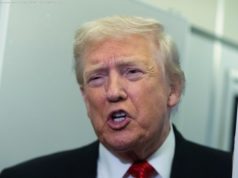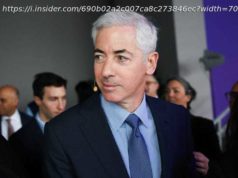A little past 5 p.m. on Tuesday, a black Ford Taurus slowed to a stop just outside FBI headquarters in Washington and dispatched a white-haired man in a dark suit.
He emerged from the car alone, a manila folder in his right hand, and walked slowly toward the agency’s appointment gate. Passersby paid little notice.
But Keith Schiller, President Donald Trump’s pugnacious former bodyguard who now sits sentry outside the Oval Office doors, was at the law enforcement agency armed with a bombshell message from his longtime boss to FBI Director James Comey: „You are hereby terminated and removed from office.“
Schiller emerged from the building just short of an hour later, the manila folder gone. By then, the stunning intent of his visit to the FBI was known, and the ramifications of a sitting president firing the man investigating his campaign’s ties to Russia were reverberating across Washington.
This account of the lead-up and the aftermath of Trump’s decision is based on interviews with more than two dozen officials at the White House, the Justice Department, the FBI and on Capitol Hill, nearly all of whom spoke anonymously to describe an extraordinarily sensitive moment for Trump and his presidency.
Backlash begins
Backlash was swift, with claims from Democrats that Trump was ridding himself of an investigator who was delving too deeply into ties between his associates and Russia. Even some Republicans, including the chairman of the Senate intelligence committee, said they were troubled by the development and its timing. Comparisons to Richard Nixon, who fired a special prosecutor probing the Watergate burglary, began flying.
The White House insisted the firing came amid questions about Comey’s handing of a probe into former Secretary of State Hillary Clinton’s email server. But that explanation was betrayed by Trump’s letter, which didn’t mention those concerns, focusing instead on the continuing inquiry into his campaign’s Russia ties.
Officials in the West Wing, many of whom weren’t aware Trump was planning to fire Comey, appeared caught off guard by the furor.
The collective recoil against the move prompted urgent meetings among Trump’s aides to manage the fallout. Hours after telling reporters that the White House would have no additional comment beyond Trump’s own words, top aides were marched to television cameras on the North Lawn to explain the decision.
One source familiar with the President’s reaction to TV coverage of the Comey firing told CNN that Trump was upset because he perceived that nobody was defending him on the cable networks. So he dispatched top communications aides Sean Spicer, Kellyanne Conway and Sarah Huckabee Sanders to appear on television to defend the White House, the source said.
Spicer, sandwiched in the dark between a gaggle of reporters and a large shrub on the White House driveway, described Trump’s decision as arriving only after a long memo from the deputy attorney general, which Spicer said was delivered Tuesday, detailing Comey’s shortcomings on investigating Clinton’s emails.
But multiple White House officials said Trump had been considering firing Comey for at least a week before he made Tuesday’s decision. Indeed, Trump revealed his anger in a string of late-night messages on Twitter May 2, exactly a week before his final decision was made public.
„FBI Director Comey was the best thing that ever happened to Hillary Clinton in that he gave her a free pass for many bad deeds!“ he wrote from the confines of his second-floor private residence at the White House. „The phony Trump/Russia story was an excuse used by the Democrats as justification for losing the election. Perhaps Trump just ran a great campaign?“
Closely held decision
The idea of firing Comey was closely held within the West Wing, these officials say, where the few aides who were aware of Trump’s intentions barely discussed the topic among themselves. Among those looped in: Attorney General Jeff Sessions and Deputy Attorney General Rod Rosenstein, who began fine-tuning their rationale for removing Comey from his post shortly after learning of Trump’s intentions.
On Tuesday, they had their explanation: Comey mishandled the investigation into Clinton’s emails.
„I cannot defend the director’s handling of the conclusion of the investigation of Secretary Clinton’s emails, “ Rosenstein wrote in a letter that the White House released Tuesday. „I do not understand his refusal to accept the nearly universal judgment that he was mistaken.“
By the time the memo was complete, Trump was already preparing to execute his decision. His schedule was almost entirely cleared on Monday and Tuesday except for meetings with his national security team. Nearly as soon as Comey’s firing was announced, Trump was meeting in the Oval Office with Andrew McCabe, the FBI deputy director, to gauge the agency’s No. 2 before elevating him to acting director following Comey’s dismissal.
Meanwhile, back at FBI headquarters, news was quickly spreading that Comey was being ushered out. Instead of delivering Trump’s letter to Comey in person, Schiller deposited the document at his office. Comey, in fact, wasn’t at his agency’s headquarters at all when Schiller arrived with the missive from the President; he was addressing agents at the FBI’s Los Angeles field office when news came down that Trump had demanded his resignation.
Instead of learning from Trump’s letter that he was being fired, Comey found out from television. TVs set to cable news inside the room he was speaking began airing reports of his demise midway through his speech. He made a joke about it to lighten the situation, phoned back to FBI headquarters, and received official confirmation that his tenure atop the law enforcement agency was over.
‚I have no reason to believe …‘
Senior Justice Department and FBI officials speaking Tuesday said they were unaware that Trump was preparing to fire Comey, describing themselves afterward as shocked by the development.
Asked hours before announcing the decision whether Trump maintained confidence in Comey, Spicer avoided answered forthrightly.
„I have no reason to believe — I haven’t asked him, “ Spicer said. „I have not asked the President since the last time we spoke about this.“
The decision came at an uneasy moment for the Justice Department, which has been at the center of controversy since Trump assumed office in January. Officials described tensions that have festered over the past several months between Justice Department leadership and senior staff at the FBI over the handling of the Clinton investigation and how Comey was running the agency, according to multiple officials.
Meanwhile, the White House and Sessions have pushed the FBI to pursue leaks of classified information to the media, according to one Justice Department official, urging the agency to prioritize the probe over other matters, including the investigation into Russian election meddling.
One Justice official suggested there could be more changes coming at the FBI beyond Comey’s removal.






